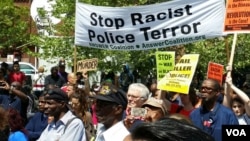The United States has mounted a vigorous defense of Washington’s pursuit of justice for all its citizens at a United Nations public hearing to examine the U.S.'s human rights record. Representatives from 117 countries questioned the U.S. on issues including police brutality, racism and torture during the half-day hearing held by the U.N. Human Rights Council in Geneva.
The U.S. was represented at the hearing by a large legal team fielding questions and sharp criticism from U.N. member states about the U.S. human rights record. The most persistent observations and expressions of disapproval had to do with alleged discriminatory practices against racial minorities and the excessive use of force by law enforcement.
The U.S. delegation said it was proud of the country's human rights record, but admitted the record was not spotless. It fell to James Cadogan, Senior Counselor to the Assistant Attorney General in the U.S. Department of Justice, to explain several controversial cases involving police and minorities, including the fatal shooting last year of 18-year-old Michael Brown in Ferguson, Missouri. The police officer who shot and killed the African-American teenager was not indicted.
Cadogan, who works in the Civil Rights Division, said the Department of Justice investigates and brings civil actions to change unlawful or discriminatory policing policies when systemic problems emerge.
“For instance, in March, we released a report finding that the police department of Ferguson, Missouri, engaged in a pattern or practice of racially discriminatory policing. Furthermore, we have opened more than 20 investigations in the last six years - including an investigation into the Baltimore Police Department announced on Friday. And, we are currently enforcing 16 landmark agreements with state or local law enforcement agencies,” said Cadogan.
The investigation in Baltimore, Maryland, follows the death of 25-year-old African-American Freddie Gray from injuries sustained while in police custody. Six officers in this case have been charged in his death.
Aggrieved expect no change
People who say they were victims of racial discrimination and attended the hearing were not satisfied with U.S. assurances it was doing its best to eliminate excessive use of force and discriminatory practices in the country’s police forces.
One person presented testimony on the sidelines of the meeting about the suffering he said he and his family endured following the fatal police shooting of his sister. An off-duty Chicago police officer fatally shot Martinez Sutton’s sister, Rekia Boyd, on March 21, 2012, while she was in a park with friends.
The police officer who shot Boyd was acquitted three weeks ago in what civil rights lawyers call a flawed trial. Sutton told VOA he does not expect that anything will change following the uproar over Michael Brown or Freddie Gray.
“I came here to raise awareness about this issue as I have been doing for three years. I have been going around asking for help… I do not expect them to do anything because - I mean: Let us be real, it has been going on for years and what has been done? As I stated before, they say the guilty should be punished. I want them to show us instead of tell us,” said Sutton.
Countries participating in the debate proposed a number of recommendations to the U.S. These included calls for the U.S. to abolish capital punishment, close the Guantanamo Bay detention facility, prevent acts of torture, eliminate racial discrimination in all its forms and combat violence against women.
The U.N. public hearing is part of the so-called Universal Periodic Review, which all 193 U.N. member countries must undergo every four years. This is the second time the United States' record has been examined under this procedure. A U.N. report on the review and recommendations are scheduled to be adopted Friday.




